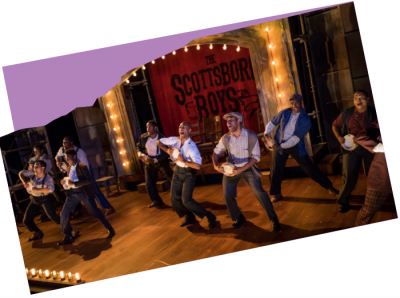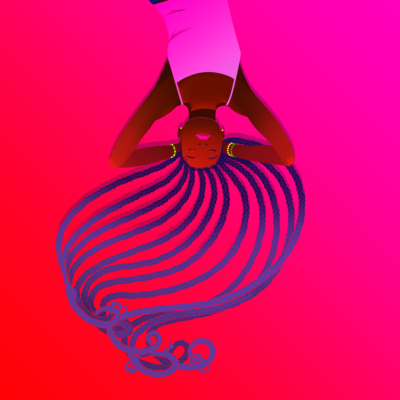Your donation sets the stage for a new season of Boston's most intimate, entertaining and provocative plays and musicals. Our shows make powerful connections with our audiences-- and they are only possible because of you.
Living With CARRIE
Living With CARRIE
Life with CARRIE
Nobody outside of Stephen King himself has more history with Carrie than Lawrence D. Cohen. Writer of the 1976 screen adaptation of King’s novel, Mr. Cohen also wrote the book for both versions of the stage musical; and along with Composer Michael Gore and Lyricist Dean Pitchford, resurrected Carrie the musical from its disastrous original run on Broadway to new life.
Recently SpeakEasy Artistic Associate Walt McGough spoke with Mr. Cohen about his first encounter with Carrie, the reasons the story endures in our culture, and the challenge of bringing King’s tale to the stage.
 How did you first discover Carrie?
How did you first discover Carrie?
Right after graduating, I moved to New York where I ended up working as a reader for legendary producer David Susskind. I came back to the office after lunch one rainy day in 1973 to find this skinny little 200-page manuscript sitting on my desk. All I knew about it was that it was a first-time novel by a high school English teacher. Of course, this unprepossessing little novel was called Carrie.
This was before the book was published?
Yes, it was a good six months before, and it was like approaching any unpublished manuscript. You don’t have a cover, you don’t have anything. I was one of the first readers and I didn’t have to read more than its incredibly visceral first five pages to realize I was in the hands of an amazing writer.
Did you find the story frightening?
In all honesty, I didn’t think of it as a horror story, or in that genre at all, at least not first and foremost. It was a whole lot of other things: it was a high-school drama centering around the original poster-child for victims of bullying; it was a portrait of adolescent brutality out of William Golding and Lord of the Flies; and it was a piece about the age-old battle between parents and kids over control and authority. It was genre-defying; there was a whole lot going on, and as a young adult in my early 20s who had more than a few issues about being picked on and bullied as a kid, it spoke to me in a very profound way.
What about the writing made all those different elements work together?
Stephen King has an interesting quality that separates him from everybody else. Often I think he is misunderstood because everybody thinks, “Oh, Stephen King, wow, what great plots.” The truth of it is, yes, the story is a great hook. But the reality is, what he’s really about (and why I think some of the movies based on his works are successful and some are not), is that he’s really writing a character. The hook is great, and they’re great situations, but it’s really that he manages to eliminate that separation between the reading experience and that feeling that you’re in it. That’s why people just rip through his books; because once you start, he makes you understand who his people are, and makes you see yourself in them in a way that’s very very gifted and unique.
What happened after you finished the manuscript?
I raced through the manuscript and proceeded to rally everyone I could to the cause of making the movie. Strangely, I found that no one was gonna touch it. There was something about the story that attracted and repelled people equally, so they didn’t know what to do with it or they were freaked out by it. Later, I moved to LA and it was job time, and I had to pay the rent again. A mutual friend put me together with a producer. I had no intention of working with a producer again after New York, but I went off to meet him. He was a very nice man, but before he could offer me the job I was already halfway down the hall. It was then that he yelled out to me, “Larry, I forgot, there’s one other piece that I’ve optioned that you probably haven’t heard of, and it’s this little book called Carrie.” I stopped, turned around, and said I’d take the job. It was just that lightning bolt of fate stepping in, and through a number of circumstances, I ended up getting the opportunity to write the script.
How did you approach the writing process?
I really thought I understood this material, and I was also really interested in preserving a… if not fidelity, then an illusion of fidelity… to the material. There would be a lot of changes, but when all was said and done, I would know I had done my job right if you didn’t know where Stephen King left off and where Larry Cohen began.
After the movie succeeded, what led you to think of the story as a musical?
Michael Gore and I were on the steps of the Metropolitan Opera in New York, and Michael looked at me and said, “Y’know, if Alban Berg were still alive, he’d be doing Carrie as an opera.” And there was this very long pause, and it just made inordinate sense right away. There were two elements to the material, one of which was the Margaret/Carrie material which I knew would play theatrically like gangbusters. I also knew, with Michael and Dean Pitchford, once he came aboard, that it was prime material for pop-opera, so to speak. The other part that appealed to us was the high school half, and that was a no-brainer. Michael and Dean had just come off writing the songs for Fame together, and their pop sensibility felt like it was in perfect sync with what this high school world was gonna be. There seemed to be a really interesting dynamic and duality, if we could pull it off, between these two very different worlds, and there was something thrilling and original about that. For the first couple of years, we had probably the most enjoyable experience of collaboration that the three of us have had as authors.
Did you ever have trouble balancing the two elements?
In the writing process, it was always clear that the Margaret and Carrie scenes were hugely dynamic, and just threatened to stop the show cold in its theatricality. It honestly never occurred to us for a second that the high school half wouldn’t do the same, until we got into production with the piece. Once we had that realization, a couple of years into the process, we decided that, at that stage of the writing experience, we needed to see the first act on its feet in order to move on. We put it up in about a week, and we looked at it, and we thought, “It’s exactly what was in our heads,” which was both the first and last time we thought that for a long time.
How did the original Broadway production come about after that?
After the reading, what we thought we needed more than anything was a director. And not just a director, but the right director. We went through directors who said “yes” but weren’t the right fit, and directors who said “no.” Ultimately, we ended up meeting with Terry Hands, who was head of the Royal Shakespeare Company. We were all really skeptical about him, but he came in and he listened to the material, and he looked at us and said, “I had no idea what to expect when I was told about this, and I’ve been offered a dozen shows since I’ve been in town, and this is the one I’m interested in.” And he proceeded to speak for an hour plus, and discourse on how he saw the material and its classical roots. We were thrilled, flattered and totally seduced because he talked an incredibly great game.
That first production is notorious in musical theatre circles. What happened?
We went through an incredibly bruising experience which turned out, for all sorts of reasons, to be a mismatch and a nightmare; we could not have made a worse choice. The show that opened on Broadway, outside of Betty Buckley and Linzi Hateley’s performances, had zero to do with what was in our minds when we wrote the show. It looked like it was set somewhere between Mars and Las Vegas. On the one hand, there were these extraordinary moments with Betty and Linzi where the audience was going out of their minds with ovations, and there were these other sections where the girls were in togas because [Hands] thought that [our references to] “Grease” meant “Greece.” So it was a very very very weird and schizophrenic experience. Had the show that opened been the show that was in our minds, and we’d gotten bad reviews and the audience hadn’t liked it, we would’ve let it go and gone on with the rest of our lives.
What did, eventually, lead to the three of you revisiting the piece?
I think we always felt that “if” was not the question, but “when.” It took time for the three of us to be ready to re-approach it, and at various different times, when one of us was ready, the others would have a meltdown at the thought of it. But we all said to each other that, at some point, we would all be ready. That point arrived in 2009 or 2010, by which point we had gotten a zillion offers to license it, which we’d refused, because we couldn’t bear to see the same thing put on stage again. But we realized that the piece had found a resonance that was unique to our times: while bullying has always existed, now, unfortunately it has become an epidemic, resulting in a heightened awareness of it. That made us recognize that the piece had life again. We decided on spec that the three of us would just get together and find a way to do it, and that’s what we did.
What were some of the big decisions you had to make?
When we did our first look at the show again, our producers asked, “When are you going to set the piece? Is it in ‘86, or ‘90, or what?” And the more we thought about it, it became painfully obvious to us that whenever it is, it’s now. The book was written in ‘74 and set a few years in the future, and we did the movie in ‘76 and it was set in ‘76, and we did the show in ‘88 and it was set in ‘88. Whatever constitutes the now, that’s when Carrie lives.
What did the process of updating and revising look like?
It was a wholesale look at the piece, in every way, to make sure it would live and feel current, and people wouldn’t be saying, “Oh, that number feels like a number from the ’80s.” We also each had our own extensive wish-lists of things that had bugged us over the years or that we wanted another shot at. There were things that the three of us all agreed on, and there were other things that were particular to each of us. We each then made our cases and rallied each other around them to see if we could change them. We were interested in showing the world as it is now out there for kids and in capturing their anxieties, hopes, fears, loves, and tensions. It became emblematic as a way to approach the entire writing of the show; there are numbers that still exist, but they’ve been totally rethought for this version.
What was one of the biggest structural changes in the new version?
There was an element triggered by [2012 Off-Broadway director] Stafford Arima, who said to me, “Have you ever thought about using Sue Snell as a way into the piece?” That was amazing to me because the first draft of the film script, back in ‘76, had her at the White Commission as a framing device. When [film director] Brian De Palma came aboard, he said, “The first thing I want to get rid of is any cutting back and forth; the story should be a train that shoots out of the station.” And I got it. It wasn’t at all a battle. I was reluctant to lose the device, but I could see the “why” of it and the way De Palma was going to deal with it. When Stafford asked his question, though, I thought that it was the most interesting way to re-approach the material, to let Sue be our surrogate. The choice felt more theatrical than cinematic, and it was far more appropriate to the stage version of Carrie.
 Past Productions
Past Productions LAUGHS IN SPANISH
LAUGHS IN SPANISH PRU PAYNE
PRU PAYNE ain't no mo'
ain't no mo' a man of no importance
a man of no importance JAJA’S AFRICAN HAIR BRAIDING
JAJA’S AFRICAN HAIR BRAIDING




